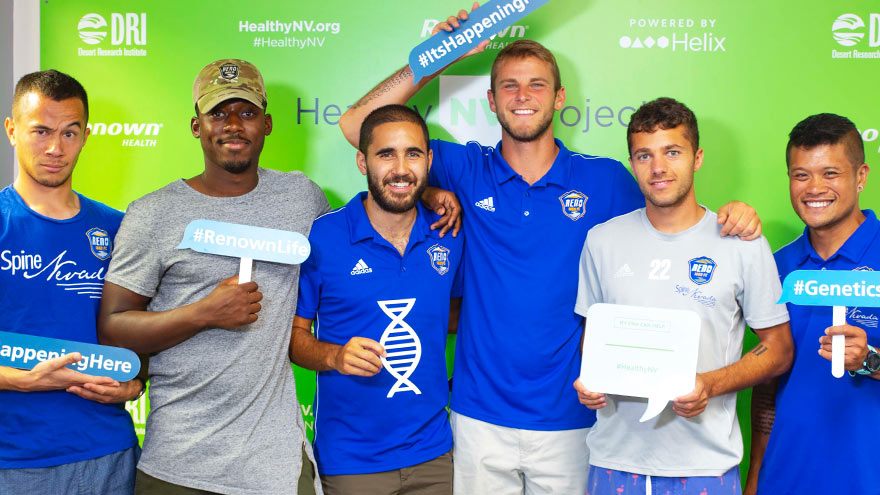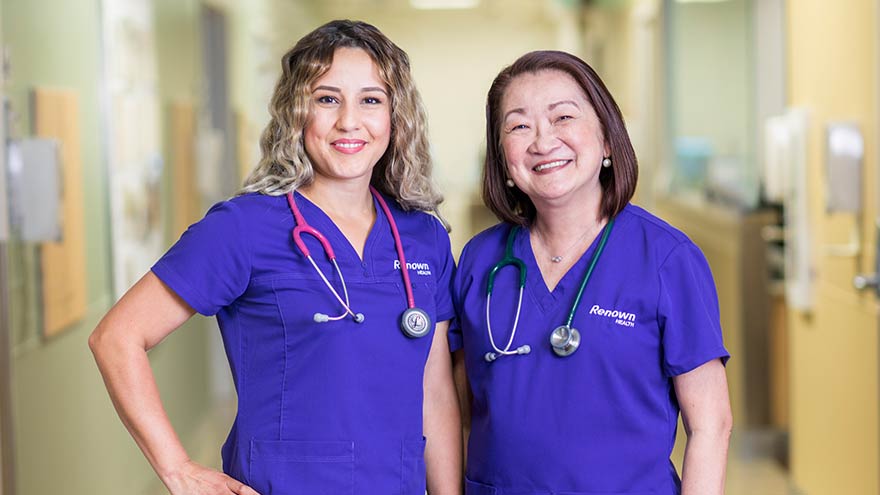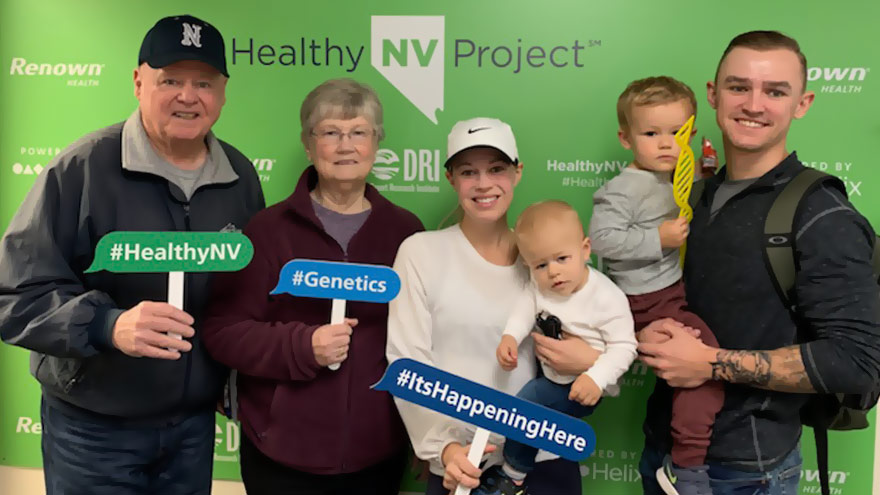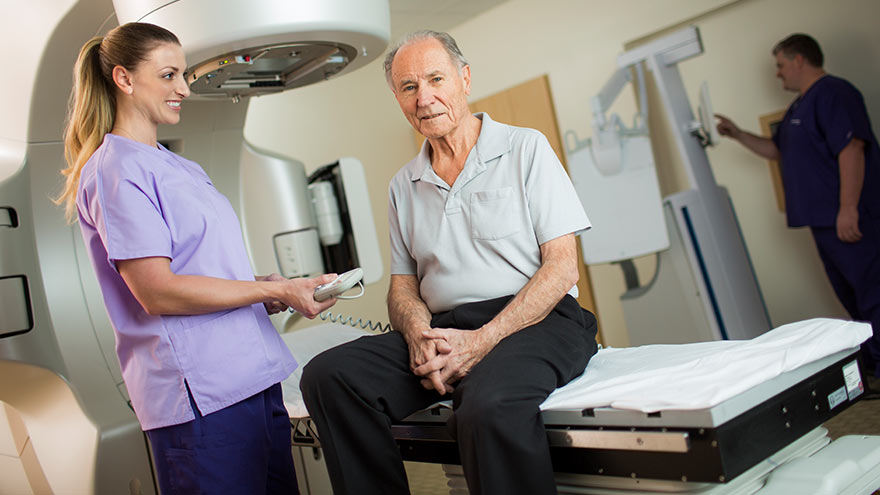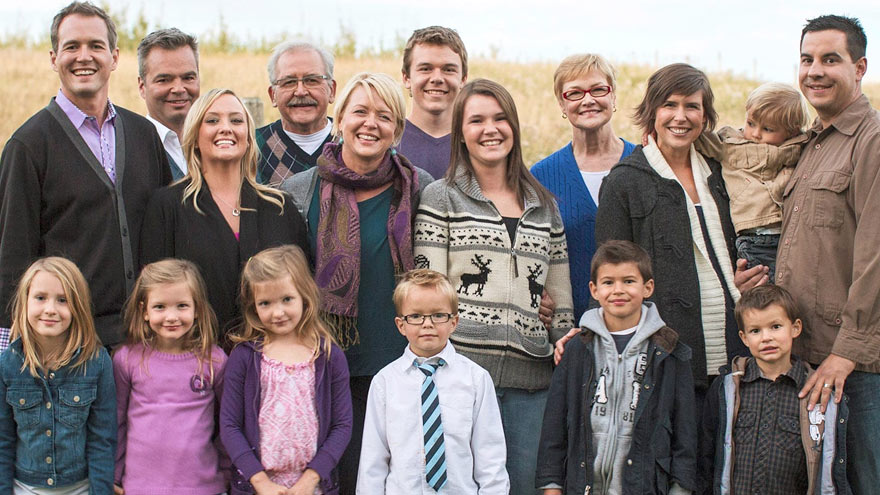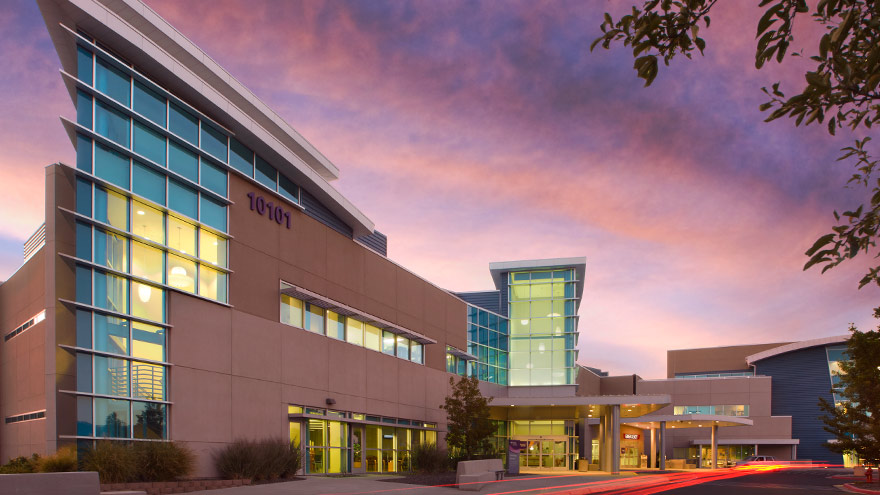Search
-
CEO Blog: Improving Health Through Genetics and Big Data
Renown Health President and CEO Tony Slonim, MD, DrPH, discusses efforts nationwide to develop a more effective and efficient way to deliver care. explains the benefits of Renown Health’s population health study with the Desert Research Institute and 23andMe.
Read More About CEO Blog: Improving Health Through Genetics and Big Data
-
Healthy Nevada Project: What We've Learned
As the Healthy Nevada Project expands to 50,000 study participants, researchers are sharing the health insights gleaned from the pilot phase of the project. Air pollution is a major health factor affecting northern Nevadans, according to data gathered by researchers in the pilot phase of the Healthy Nevada Project, one of the largest population health studies in the country. Today, the project — which began 18 months ago as a partnership between Renown Health and the Desert Research Institute — is expanding to add 40,000 additional participants bringing total enrollment to 50,000 Nevadans. “We are thrilled to share the first insights from our 10,000-person pilot phase and discuss how we will begin using those results to improve patient care,” says Anthony Slonim, M.D., Dr.PH., FACHE, president and CEO of Renown Health and president of Renown Institute for Health Innovation, a collaboration between Renown and DRI. Healthy Nevada Project Pilot Phase — and What Happens Next The pilot phase of the Healthy Nevada Project proved Nevadans are excited to know more about themselves and want to contribute to research that could improve health outcomes for the entire state. The pilot phase enrolled 10,000 participants in less than 48 hours and DNA sample collection from each participant was completed in just 69 working days. Based on pilot phase data, researchers have seen increased use of regional healthcare services correlated with fluctuations in air quality and so-called “bad air events” such as wildfires and atmospheric inversions. In phase two, Renown IHI will evaluate possible links between genetics and increased susceptibility to respiratory ailments. Study researchers also announced care providers and scientists will begin working on a number of clinical programs and scientific studies focused specifically on Washoe County’s high age-adjusted death rates for heart disease, cancer and chronic lower respiratory disease. Collectively, these conditions among local residents stand at 33 percent above the national rate. In the coming months, Renown IHI will begin providing advanced calcium score screenings to pilot phase participants at higher risk for cardiovascular disease. This will allow researchers to examine the link between genetics and calcium buildup in the heart. Researchers are also evaluating future studies focused on age-related macular degeneration and breast cancer risks in northern Nevada. Pilot Phase Insights Fifty percent of pilot study participants responded to a comprehensive, socioeconomic survey, which revealed: High rates of lower respiratory disease in northern Nevada and co-morbidities such as diabetes and hypertension suggest air pollution in northern Nevada is a confounding and significant factor in health. Study participants had parents who died from cancer and heart disease at a higher rate than the age-adjusted national average. Study participants exercised less than recommended by the American Heart Association and expressed interest in receiving help with behavior modification using diet/nutrition and weight loss tools. In phase two, if study participants choose to complete a follow-up survey, they will have the chance to pick an additional health and wellness app specific to their individual genetic results. Learn More To see if you are eligible to participate in the study, to sign up for study updates and for full details on the Healthy Nevada Project, please visit HealthyNV.org.
-
One Patients Story of Survival
Thanks in part to the care provided by Renown’s award-winning team of ICU nurses, Tony Mowatt is alive, thriving and engaged. Read his story — and learn about the exclusive Beacon Award of Excellence — below. The open road. The growl of the engine. The feeling of freedom. That’s what Oakland resident Tony Mowatt was enjoying as he drove up Highway 88 toward Reno for the semi-annual Street Vibrations event. But he wasn’t expecting to hit the diesel truck — or to fly off of his bike over 100 yards, skidding onto the side of the road. He was severely injured and in the midst of rural Nevada. He had crashed just outside Centerville, Nev., and was miles away from any critical care hospital. Having the only trauma center equipped to treat his serious injuries, Tony was flown to Renown Regional Medical Center and admitted to the intensive care unit (ICU). ICU Nurses Treat Patient, Support Family Tony’s girlfriend, Tasha Klubock, was notified by his friend that he had been taken to the hospital. She immediately drove from Oakland to Reno to see Tony at Renown. Her first night there was overwhelming and scary — nobody knew if Tony was going to survive. But the nurses helped Tasha cope with the initial shock. Caring for the patient isn’t their only job — they also care for the family. “They [the nurses] just kept coming in and checking on me,” she said. “Angela was so amazing that first night. I really just bonded to her, and I remember when the shift switched, I panicked thinking about who was coming on and wanting to meet the next nurse … But they all came to talk to me — I had updates from everybody. It was just amazing.” ICU Nurses Became Family Tony spent 32 days in Renown’s Sierra ICU, surviving a serious head injury, all with Tasha by his side. He and Tasha still stay in touch with Renown nurses. “Even though this was literally one of the most hideous, craziest things to go through,” Tasha said. “There was so much hope and they became such a family to me and I still think of that time fondly because of the nurses.” “I’m alive because they wanted me to be,” Tony said. And Tony and Tasha are now happily engaged and planning their wedding. Exceptional Care: Renown ICU Nurses Win Awards Renown’s ICU nurses provide care like this every day to countless patients — it’s so second nature to them that they forget how exceptional it truly is. But it’s certainly care like Tony’s that has earned them national recognition. The American Association of Critical Care Nurses awarded the Beacon Award of Excellence to the Sierra, Cardiac and Roseview ICUs. These are the only ICUs in Nevada to obtain this honor. The Beacon Award recognizes critical care nursing teams who exemplify excellence in areas like leadership, process systems, quality care, knowledge, learning and development, excellence in patient care and superior patient health outcomes. “I couldn’t have been more proud of what we’ve done to accomplish this,” said Nick Dovedot, Cardiac ICU nurse. “It represents who we are. Just a great group of individuals who all work together as a team to make our patients get better.”
-
The Healthy Nevada Project Changed My Life: A Local Mom's Story
Read about Jordan Stiteler, a local mom who says the Healthy Nevada Project provided insights into her family’s genetic makeup — and the likely cause of her dad and great grandfather’s deaths. Now she is changing her life due to her new diagnosis of familial hypercholesterolemia, which will allow her to take steps toward preventing the same fate. Jordan Stiteler’s dad died suddenly of a stroke nearly ten years ago — at only 45 years old. His grandfather died at age 40. Now through the Healthy Nevada Project’s no-cost genetic testing, she is closer to understanding why that may have happened. And she can take proactive steps to prevent the unhealthy symptoms that often lead to a stroke and heart problems. After getting her Geno 2.0 by National Geographic ancestry report, Stiteler got a call from Renown Institute for Heart & Vascular Health Cardiologist and Renown IHI Director of Research, Dr. Christopher Rowan. “They told me that I have FH, which is familial hypercholesterolemia,” she said. “I have genetically very high cholesterol because I have a non-functioning gene that doesn’t get rid of my cholesterol like a normal body would.” Familial Hypercholesterolemia: Simple Life Changes Dr. Rowan told Stiteler it is curable with medication and a change in lifestyle. Stiteler has embraced healthy lifestyle changes by exercising more and eating healthier. “It is so important. Being a mom, I think you have so much more to live for. Having this information has changed my life.” Stiteler feels confident FH affected her Dad. “It is helping my family realize that we need to get tested,” she said. “There were big milestones that my Dad missed. He didn’t get to see either of us get married or have our children. That was huge.” She has become passionate about sharing the need to join the Healthy Nevada Project as her way of helping to prevent other families from possibly going through what she and her family did with the early loss of her Dad. In addition to FH results, the Healthy Nevada Project is returning clinical results on BRCA 1/2 (hereditary breast and ovarian cancer) and Lynch syndrome (colorectal and endometrial cancer) to consenting study participants. To sign up for the Healthy Nevada Project, go to HealthyNV.org. Join the Healthy Nevada Project Recruitment for phase two is still open. In addition to opting in to receive clinical results, participants receive National Geographic’s Geno 2.0 ancestry app at no cost. They also have the chance to pick an additional app for health and wellness after completing a follow-up survey. Learn More or Sign Up
Read More About The Healthy Nevada Project Changed My Life: A Local Mom's Story
-
Healthy Nevada Project Returning Clinical Results to Participants
The Healthy Nevada Project – a first-of-its-kind population health study combining genetic, clinical, social and environmental data – has reached another landmark milestone. The study is notifying study participants at risk for familial hypercholesterolemia, BRCA and Lynch syndrome. “I took part in the Healthy Nevada Project to find out my ancestry. I didn’t even realize the test could give me so much information,” says 29-year-old Jordan Stiteler, who was recently diagnosed with familial hypercholesterolemia (also known as FH) through the Healthy Nevada Project. “After my dad passed away suddenly at age 45, I learned I had high cholesterol but I didn’t know it was genetic and I didn’t get an FH diagnosis until last week,” Jordan explains. “I immediately changed my diet, started walking more and doing more cardio. I also set up an appointment with my primary care physician for the first time in a while. I’ve talked with my family and even strangers about testing since my diagnosis. I hope my story will inspire others to test and can save someone’s family from going through the same loss I did.” Healthy Nevada Project Notifying Patients of Familial Hypercholesterolemia Risks Jordan is among the first Healthy Nevada Project participants to receive clinical results from the genetic study led by Renown Institute for Health Innovation (Renown IHI) – a collaboration between Renown and the Desert Research Institute Foundation. This groundbreaking population health study is now reaching out to study participants like Jordan, who asked to be notified of health risks. If study volunteers choose, the project will also provide guidance on treatment and additional testing for family members who may also be at risk. The project is starting with the return of FH risks which is a genetic tie to high cholesterol. Just a few months ago, a paper in the Journal of the American College of Cardiology recommended genetic testing become the standard of care for patients with a definite or probable FH diagnosis. Jordan says she plans to have her young son tested as well. “This is the future of health; not just reacting to sick people, but a coordinated effort between innovative technologies, data-driven researchers, and responsive practitioners to deliver personalized interventions to identify, prevent and treat disease,” says Anthony Slonim, M.D., Dr.PH., FACHE, president and CEO of Renown Health and president of Renown IHI. “As care providers, we often don’t see patients until they’re already sick and that’s a difficult problem. By embracing personal genomics, we can accelerate the ability of researchers to access data and apply those learnings back to our health system sooner.” In the Months Ahead: Notification of BRCA1/2 & Lynch Syndrome Risks The Healthy Nevada Project will start notifying study volunteers at risk for other CDC Tier 1 conditions including hereditary breast and ovarian cancer syndrome (BRCA 1/2 genes) and Lynch syndrome in the months ahead. These conditions are the key focus for the Healthy Nevada Project. The reason: Because early detection and treatment will save lives, and these conditions are some of the most common. “This research allows us to look into cancer, cardiac, respiratory illness and beyond to identify underlying causes, assess real risks and eventually initiate appropriate preventive actions much earlier. Human subject research is often intangible to participants – we are treated as subjects. The Healthy Nevada Project is creating actionable information for our participants while engaging in leading-edge research on health determinants,” said Joseph Grzymski, Ph.D., associate research professor at DRI, principal investigator of the Healthy Nevada Project and chief scientific officer for Renown Health. Landmark Population Health Study Continues to Expand Since launching two years ago, the Healthy Nevada Project has quickly evolved and expanded. The pilot project enrolled 10,000 participants in just 48 hours in September 2016. In March 2018, phase two of project expanded to an additional 40,000 participants with genetic testing partner, Helix. Helix’s genomic sequencing provides participants and researchers greater depth and quality of DNA data. With this, they can gain further insights to improve health. During a recent media roundtable announcing the return of clinical results, the Healthy Nevada Project also announced plans to complete testing of 40,000 people by the end of 2018. This will bring the project’s total enrollment to 50,000 people – approximately 10 percent of northern Nevada’s population. The Healthy Nevada Project hopes to reach more than 250,000 people in its next phase. The ultimate goal is to offer genetic testing to every Nevadan interested in learning more about their genetics and health. Join the Healthy Nevada Project Recruitment for phase two is still open. In addition to opting in to receive clinical results, participants receive National Geographic’s Geno 2.0 ancestry app at no cost. They also have the chance to pick an additional app for health and wellness after completing a follow-up survey. Learn More or Sign Up
Read More About Healthy Nevada Project Returning Clinical Results to Participants
-
Local Organization Receive $250K Build Health Challenge Award
Award given to Truckee Meadows Health Communities, Renown Health & Washoe County Health District. Truckee Meadows Healthy Communities (TMHC), Renown Health and the Washoe County Health District received the BUILD Health Challenge® award, a $250,000 grant to support Caring For Reno’s Elders (C.A.R.E.) program. The award comes as a collaborative result of more than 30 local organizations submitting a proposal for the funding. Renown Health announced that the organization is matching the grant alongside other pledged funding from the community, bringing the current C.A.R.E. support to $580,000. Together the entities will focus on senior loneliness and the health issues it creates. The partners are honored that Truckee Meadows was selected as one of 18 communities to receive funding from BUILD in the 2019-2021 term. “C.A.R.E will be a community approach to enhance life quality for elders by reducing social isolation and loneliness, issues that seriously impact senior health,” said co-team leader Kindle Craig, Sr. Director Renown Institutes. “Loneliness is the root cause of many issues including suicide1 , chronic disease2 and a reduction in lifespan3 . Washoe County senior suicide rates are two and four times the national rate for those aged 65 and 85 years, respectively4 . That is unacceptable.” Sharon Zadra, TMHC executive director and co-team leader, said this project will tackle barriers to socialization such as access to affordable housing, transportation and healthcare. “We’ll bring the entire community on-board, long-term, to increase social connectedness and reduce health and mortality issues associated with loneliness by starting a cross generational ‘Kindness Epidemic,’” Zadra said. The BUILD Health Challenge is a national program focused on bold, upstream, integrated, local and data driven projects that can improve community health. The award provides funding, capacity building support and access to a national peer-learning network to enhance collaborative partnerships locally to address our community’s most pressing health challenges. The C.A.R.E team expresses special thanks to the BUILD Health Challenge for its support of this initiative. “Loneliness and isolation in our senior population leads to declines in both mental and physical health, and increased mortality,” said Kevin Dick, Washoe County District Health Officer. “We are incredibly honored to join the BUILD cohort, teaming with TMHC and Renown Health to bring long-term solutions by building a cohesive social network to improve the health of our elders.” The BUILD Health Challenge® is made possible with the support of: BlueCross BlueShield of South Carolina Foundation, the Blue Cross and Blue Shield of North Carolina Foundation, Blue Shield of California Foundation, Communities Foundation of Texas, de Beaumont Foundation, Episcopal Health Foundation, The Kresge Foundation, Methodist Healthcare Ministries of South Texas, Inc., New Jersey Health Initiatives, Robert Wood Johnson Foundation, and W.K. Kellogg Foundation. TMHC, Renown Health and WCHD have worked united for the last five years, rallying diverse partners and community leaders to influence and advocate for the region’s capacity to ensure a healthy community.
Read More About Local Organization Receive $250K Build Health Challenge Award
-
What Is the Importance of Having an Institute for Cancer?
What is an institute for cancer — and why does it matter that we have one right here in Reno? Here, a radiation oncologist answers those questions and more. Sadly, our community health needs assessment shows cancer is the second leading cause of death in Washoe County. But many residents may not know there is an institute for cancer right here in Reno that can care for you or your loved one after diagnosis. Dr. Michael Hardacre, a radiation oncologist with Renown Institute for Cancer is here with more. What is an institute for cancer? The way I like to think of it: An Institute has healthcare providers highly trained in patient-centered care. For example, when you have cancer, many times you’ll see a lot of doctors. A program brings those doctors together — so you really have one team working together. An Institute takes that one step further. Say there are other needs beyond the doctor’s office such as nurse navigators, dietitians, physical therapists to help you get on track, etc. An Institute really proactively thinks of the need of the cancer patient. It then makes sure all those things are available to them throughout their treatment. The term “institute for cancer” identifies a cancer program that is comprehensive and multidisciplinary in nature. For Renown, that means that we have the specialists in medical oncology, surgical oncology and radiation oncology working together with other specialists to assure that a patient has coordinated care throughout the entire treatment course of cancer care. Together with cancer prevention and diagnostics, genetic assessment, supportive care, clinical trials, and cancer survivorship, the institute for cancer provides care for the community, families and patients along the entire spectrum of cancer care. What types of cancer do you treat? We’re fortunate to be able to provide cancer treatments for all types of cancers, and we’re one of the major referral centers for northern Nevada. Most commonly, just like much of the country, lung cancer, prostate cancer and breast cancer are the most frequent we see. Our care spans brain, to neck cancer and everything in between. As an accredited comprehensive community cancer program, Renown Health provides services for all cancer types. The highest volume cancers treated at Renown are breast, colorectal, lung, genitourinary, blood and gynecologic cancers. Most treatments can be done right here in Reno, but when there are specialty needs such as stem cell or bone marrow transplantation, we partner with quaternary centers, like Stanford, to assure a smooth transition of care both to and from the quaternary center. What kinds of care and treatments are offered? We offer a wide range of comprehensive care. We treat the cancer itself — surgical, radiation oncology, medical oncology in the form of chemotherapy or pills. Also addressed: dietary needs, physical therapy and navigation through this whole process. People may be surprised by the scope and scale of the Renown Institute for Cancer. For instance, our Radiation Center has the latest technologies to treat cancers. This includes the Linear Accelerators, which are machines with treatment planning software tools. In addition to the traditional external radiation treatments provided in most centers, Renown performs specialty treatments using High-Dose Brachytherapy, a treatment with an active radiation “source” and in Brain Stereotactic Radiosurgery, assuring that patients can stay right here in northern Nevada — close to home. What does that mean for the quality of care? I think it’s always great in any environment to have external people come into your program and not only share what’s happening nationally and what we could do better, but also to validate “are you doing things at the highest level you can?” That accreditation process is just one way to give us that seal of approval. We’re lucky enough this year to get the gold award by the American College of Surgeons — its highest honor. We were honored to receive it. Why is important that you’re an accredited institute? Accreditation assures our community that quality is a top priority for us. Each of the accrediting bodies has a set of standards that identify service and quality standards. Renown Institute for Cancer has the following accreditations: American College of Surgeons’ Commission on Cancer: Full Cancer Program accreditation, standards address issues from cancer prevention/diagnosis to treatment to survivorship and/or end-of-life. Renown received the Gold Level Accreditation in 2018, the highest level of accreditation possible; American College of Surgeons’ National Accreditation Program for Breast Centers: Full Breast Center/Program accreditation, standards address issues from breast cancer prevention/diagnosis to treatment to survivorship and/or end-of-life; American College of Radiology – Radiation Therapy: Full Radiation Oncology accreditation for radiation equipment, treatment planning, treatment and treatment follow-up; and American College of Radiology – Mammography Services.
Read More About What Is the Importance of Having an Institute for Cancer?
-
How to Fight Cancer that Runs in the Family
Your mother had breast cancer. Your uncle had colon cancer. A cousin has stomach cancer. Could yours be the next name to make the family cancer list? “Possibly,” says Dr. Robert Nathan Slotnick, MD, PhD, Medical Geneticist at Renown Medical Group. In this article, the doctor discusses the genetics behind Lynch syndrome — and how you and your family can fight it. What is Lynch Syndrome? Lynch syndrome, also known as hereditary non-polyposis colorectal cancer (HNPCC), is one of the most common genetic conditions known to increase cancer risk in individuals and families. It enables colon and other cancers to develop by causing mutations in mismatch repair (MMR) genes. “The genes MLH1, MSH2, MSH6, PMS2 and EPCAM normally help to repair damaged DNA,” explains Dr. Slotnick. “But when they don’t work properly, naturally occurring DNA replication errors are not repaired efficiently. These errors accumulate and cancer can be the result.” Colon cancer is just one of many possibilities. People with Lynch syndrome also have a higher risk of developing endometrial cancer (cancer of the inside lining of the uterus) as well as cancer of the ovaries, stomach, pancreas, kidney, brain, and bile duct, among others. These syndrome-enabled cancers often appear in patients before the age of 50. Family Cancer Clues The family connection to cancer is a strong one notes the doctor. “Cancer is best considered a genetic disease because it is always tied to changes (or mutations) in our inherited material: our DNA,” says Dr. Slotnick. “These DNA changes cause cells to lose control of their normal constraints on growth and metabolism and can allow abnormalities to develop.” “Although all cancers are genetic,” he adds, “not all cancers are hereditary or passed down through generations.” But because Lynch syndrome IS a hereditary condition, personal and family cancer histories provide invaluable information toward diagnostic confirmation and to a path of surveillance, prevention and treatment. Once a strong family history of cancer is confirmed, doctors and geneticists can move forward with targeted genetic testing to identify specific gene mutations. If Lynch syndrome is diagnosed, testing can also reveal your risk for associated cancers. And your results could be a wake-up call to family members. According to the Centers for Disease Control and Prevention (CDC), close relatives of people with Lynch syndrome have a 50% chance of having similar gene mutations and a higher risk of cancer. The good news is detection and prevention progress is being made. “Lynch is just one of many cancer syndromes where risk is tied to heredity,” explains Dr. Slotnick. “In the last few years, our ability to identify those at risk for this type of cancer predisposition has improved markedly, both in diagnostic accuracy and cost. This allows us to provide aggressive surveillance and prevention choices to individuals and families at risk. Healthier families and lower cost: it’s a win-win.”
-
Staying Heart-Healthy with Genetic Screening
February is American Heart Month. While cardiac care is crucial every time of year – especially as heart disease stays the number one killer in the United States – American Heart Month serves as a great reminder to stay on top of your heart health. We spoke with Malina Ruiz, a cardiology nurse practitioner at Renown Health, on three key ways to embrace heart-healthy living and how genetic screening can help inform you of certain genetic risks that can play a role on the cardiac life stage. 1. Invest in a heart-healthy diet. Eating a diet that is rich in fruits, vegetables, whole grains and healthy fats (including monounsaturated fats such as avocados and polyunsaturated fats such as sunflower oil) is a key defense in protecting your cardiac health, according to Malina. While you are filling your plate with these nutritious foods, remember to keep an eye on your saturated and trans-fat intake, and try limiting foods that are high in those fats. “No matter what age we are, maintaining a heart-healthy diet will always be important,” said Malina. Need help finding cardiac-friendly meals? The National Heart, Lung and Blood Institute makes it easy with heart-healthy recipes and tips from experts. 2. Do an exercise audit. “Keeping an active lifestyle during our younger years is one of the most important factors that affect heart health in future years,” said Malina. Maintaining a regular exercise regimen that allows you to raise your heart rate and break a sweat can help prevent future cardiac events. A good rule of thumb is to aim for 150 minutes a week of moderate-intensity exercise, which averages out to 30 minutes a day on 5 days out of the week. It’s never too late to start a regular exercise routine! Exercise doesn’t have to be something you dread – leverage American Heart Month to find activities that you enjoy. The American Heart Association can help you discover new ways to move your body. At the end of the day, as Malina emphasizes, “any movement is better than nothing!” 3. Don't skip those check-ups. Regular preventative visits with your primary care provider can help you identify possible risk factors for heart conditions before they start actively affecting your life. “Check-ups become even more important as we age, along with being aware of the signs and symptoms of heart disease, heart attack and stroke,” added Malina. There’s no time better than the present – call our expert scheduling team today at 775-982-5000 to request a preventative check-up with your primary care provider.
Read More About Staying Heart-Healthy with Genetic Screening
-
Taking Control of Her High Cholesterol and Health
In 2018, Jordan Stiteler became a Healthy Nevada Project advocate. Her DNA results revealed that she had Familial Hypercholesterolemia (FH). FH is a genetic condition that can cause high cholesterol. Since then, Jordan’s taken action to lower her cholesterol and make her family aware of this potentially dangerous condition. Read Part I of Jordan’s story Taking Control of High Cholesterol Looking at Jordan, an active young mother, you would never suspect she has high cholesterol. However, because of FH, Jordan’s cholesterol levels are unusually high. She chose to take action when learning of her FH gene, in order to maintain her long-term health. Jordan started by exercising more and eating healthier. “I’ve definitely been checking all the labels to see if the food has a lot of cholesterol, trans fats, or saturated fats,” she explains. She now eats a 100% plant-based diet which helps to lower her cholesterol naturally. Additionally, Jordan partnered with Dr. Michael Bloch, a lipid specialist, to monitor and manage her cholesterol. She told Dr. Bloch that she and her husband were planning on having a second baby. With this in mind, he helped Jordan create a plan to accommodate her pregnancy. Several months after giving birth to her beautiful daughter Logan, it was time to revisit her cholesterol treatment plan. Dr. Bloch prescribed Jordan a statin called Lipitor. It successfully cut her total cholesterol by half in just three months. “I had blood work done in November 2019 and my total cholesterol was 293 (normal is less than 199). I started taking cholesterol medication in February 2020. I had blood work done in June 2020 and my total cholesterol was 149, ” Jordan shares. “My LDLs went from 219 to 78! I am so grateful that the medication worked so well and so quickly! It’s a weight lifted off of my shoulders.” Although Jordan no longer limits herself to a strictly vegan diet, she is mindful of what she eats and how it affects her cholesterol. She’s thrilled that her cholesterol is now at a healthy level!
Read More About Taking Control of Her High Cholesterol and Health
-
Thomas S Dolan Pulmonary Rehabilitation Program
The program becomes first of its kind to be accredited in Nevada Renown Health is pleased to announce the certification of the Thomas S. Dolan Pulmonary Rehabilitation program at Renown South Meadows Medical Center by the American Association of Cardiovascular and Pulmonary Rehabilitation (AACVPR). AACVPR certification demonstrates that an organization's Pulmonary Rehabilitation Program is aligned with current guidelines set by the American Association of Cardiovascular and Pulmonary Rehabilitation for appropriate and effective early outpatient care of patients with cardiac or pulmonary issues. Certification offers peace of mind, so that patients can feel confident in knowing that staff has the experience and skills necessary to coordinate the many issues faced by people receiving a life-changing cardiac or pulmonary diagnosis. Pulmonary rehabilitation programs help people with health issues such as asthma, chronic bronchitis, pulmonary fibrosis, or chronic obstructive pulmonary disease (COPD) recover faster and live healthier. “Having access to quality pulmonary rehabilitation services so close to home, staffed by a highly skilled group of compassionate care providers, truly is a gift to our community,” said Tony Slonim,MD, D.Ph., president and CEO of Renown. “We are extremely proud of the work being done in our pulmonary rehabilitation program, and also forever grateful for Tom Dolan’s donation to the program in 2019, which empowers Nevadans to improve both their health and quality of life.” “Thomas S. Dolan Pulmonary Rehabilitation is the only accredited pulmonary rehabilitation program in the state of Nevada,” said Renown South Meadows Medical Center and Rehabilitation Hospital Vice President Chris Nicholas. “We take pride in this distinguished honor from the AACVPR as it acknowledges and amplifies the life-changing work happening here. Our dedicated caregivers provide support to our patients every step of the way, helping them lead vibrant and fulfilling lives despite their health conditions.” The comprehensive pulmonary rehabilitation program at Renown South Meadows Medical Center offers treadmills, stationary bicycles, strength training and an education classroom to help patients achieve health goals. To earn accreditation, Renown’s pulmonary rehabilitation program participated in an application process requiring extensive documentation of the program’s practices. AACVPR Program Certification is the only peer-review accreditation process designed to review individual programs for adherence to standards and guidelines developed and published by AACVPR and other related professional societies. In November 2019, Tom Dolan, owner and founder of Dolan Auto Group, donated to the Pulmonary Rehabilitation at Renown South Meadows Medical Center after his personal experience thriving in pulmonary rehabilitation brought northern Nevada’s capabilities, and needs to his attention. His generous donation has allowed Renown to double the number of patients who receive treatment and increase the access to pulmonary rehab in our community. “As a former patient myself, I found so much benefit in my pulmonary rehab,” said Dolan. “I have always wanted to support this program and increase the number of people it serves. It’s great to see that we now have the only certified pulmonary rehab in Nevada. “The most essential component of lung health is breaking the cycle of inactivity associated with lung disease,” said Lung Critical Care Physician Dr. Farah Madhani-Lovely. “Our community is fortunate to have an accredited program like this to empower our patients.” About AACVPR Founded in 1985, the American Association of Cardiovascular and Pulmonary Rehabilitation is a multidisciplinary organization dedicated to the mission of reducing morbidity, mortality and disability from cardiovascular and pulmonary disease through education, prevention, rehabilitation, research and disease management. Central to the core mission is improving the quality of life for patients and their families. Learn more about AACVPR at www.aacvpr.org.
Read More About Thomas S Dolan Pulmonary Rehabilitation Program
-
South Meadows Medical Center Named Number 1 Hospital
U.S. News & World Report recently released their 2020-21 Best Hospitals rankings naming Renown South Meadows Medical Center as the number one hospital in Nevada. U.S. News looked at 4,554 hospitals, which represent nearly all U.S. facilities providing inpatient care. Hospitals are evaluated across a wide range of conditions and procedures, including 16 medical specialty areas of care. “We are committed to be among the best in the nation for quality, safety and patient experience,” said Tony Slonim, MD, D.Ph., FACHE, president and CEO of Renown. “This ranking confirms what Renown has always been dedicated to — providing the best patient care possible. Quality and safety are the responsibility of every employee and physician at Renown, and we are proud that Renown South Meadows has been chosen as the best in the state and among the best in the nation.” “We thank the incredible physicians, nurses and employees at Renown South Meadows Medical Center and across Renown for their dedication to excellent patient care – our employees, patients and our community are the true award winners,” said Chris Nicholas, Vice President & Administrator, Renown South Meadows & Renown Rehabilitation Hospital. “We applaud them as being not only the best in the state, but among the best in the nation.” “We are proud that Renown South Meadows is one of Nevada’s highest rated hospitals, and it’s exciting to have that recognition. Over the last year both our acute care hospitals – South Meadows and Renown Regional Medical Center, have made substantial improvements. We are working every day to ensure we are delivering the highest quality, safest care to our patients and our community,” said Dawn D. Ahner, DSc, FACHE, Chief Operating Officer — Acute Services for Renown. Renown South Meadows has been recognized by several national organizations for excellence and quality, including the Joint Commission, Leapfrog and Health Insight. Renown South Meadows Medical Center is an Accredited Chest Pain Center, and a Pathway Designated hospital for nursing excellence. Renown South Meadows provides an emergency department staffed 24/7 with board-certified emergency physicians, a wide range of services including primary and urgent care medical offices, a lab and health improvement programs. Renown is currently recruiting outstanding employees at https://careers.renown.org/.
Read More About South Meadows Medical Center Named Number 1 Hospital

